Scott Miller, B.15 Modelmaking Workshop Technician
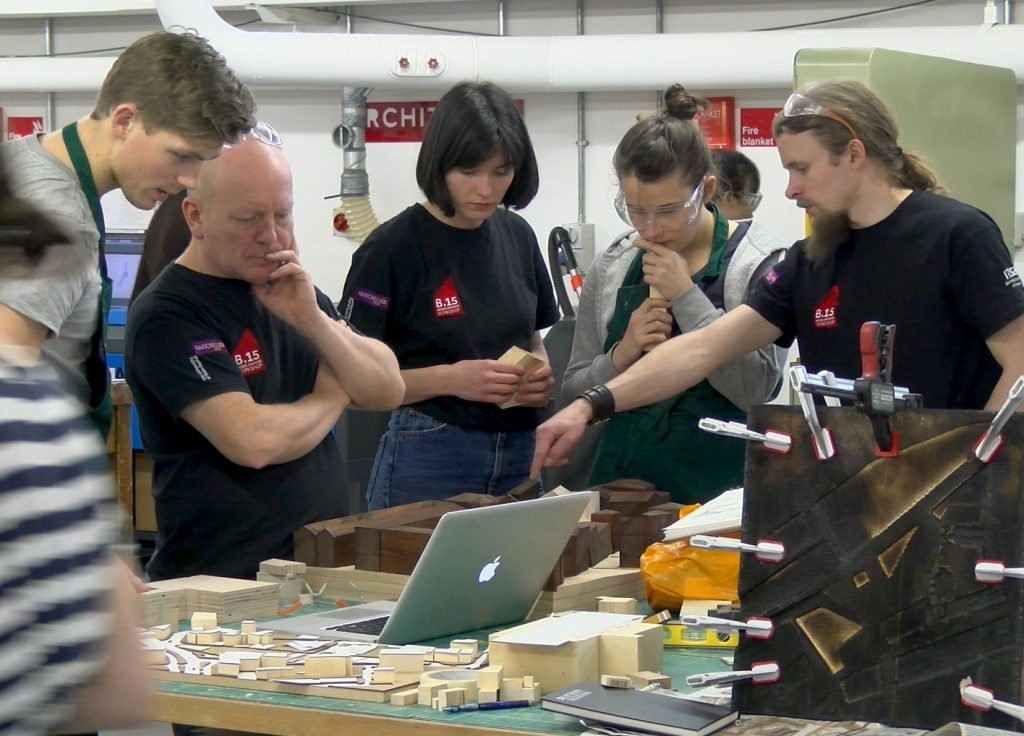
A lesser known part of the School of Environment, Education and Development is the School of Architecture which, through a joint agreement with Manchester Metropolitan University forms the Manchester School of Architecture. Students, Enrolled at both Institutes study Architecture from between 3 and 5 years of study which covers a wide range of disciplines any of which graduates can choose to pursue.
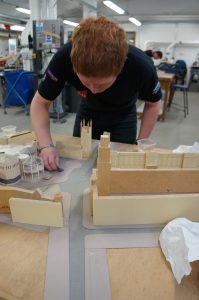
One of the longest standing departments within the school, the B.15 Modelmaking Workshop at UoM can be found in the basement of Humanities Bridgeford Street. The staff comprises Senior Technician James Backhouse, Technician Scott Miller and the recent addition of Technical Assistant Saul Parker-Backhouse. In late 2017 the school decided to make its mark at the 16th Venice Architecture Biennale, the world leader in architectural, art and design exhibitions. Rather than take the traditional approach of focussing on displaying resolved projects, our focus was much more anthropological, analysing our own practice and why the process of making models in design has an enduring appeal to our students and graduates.
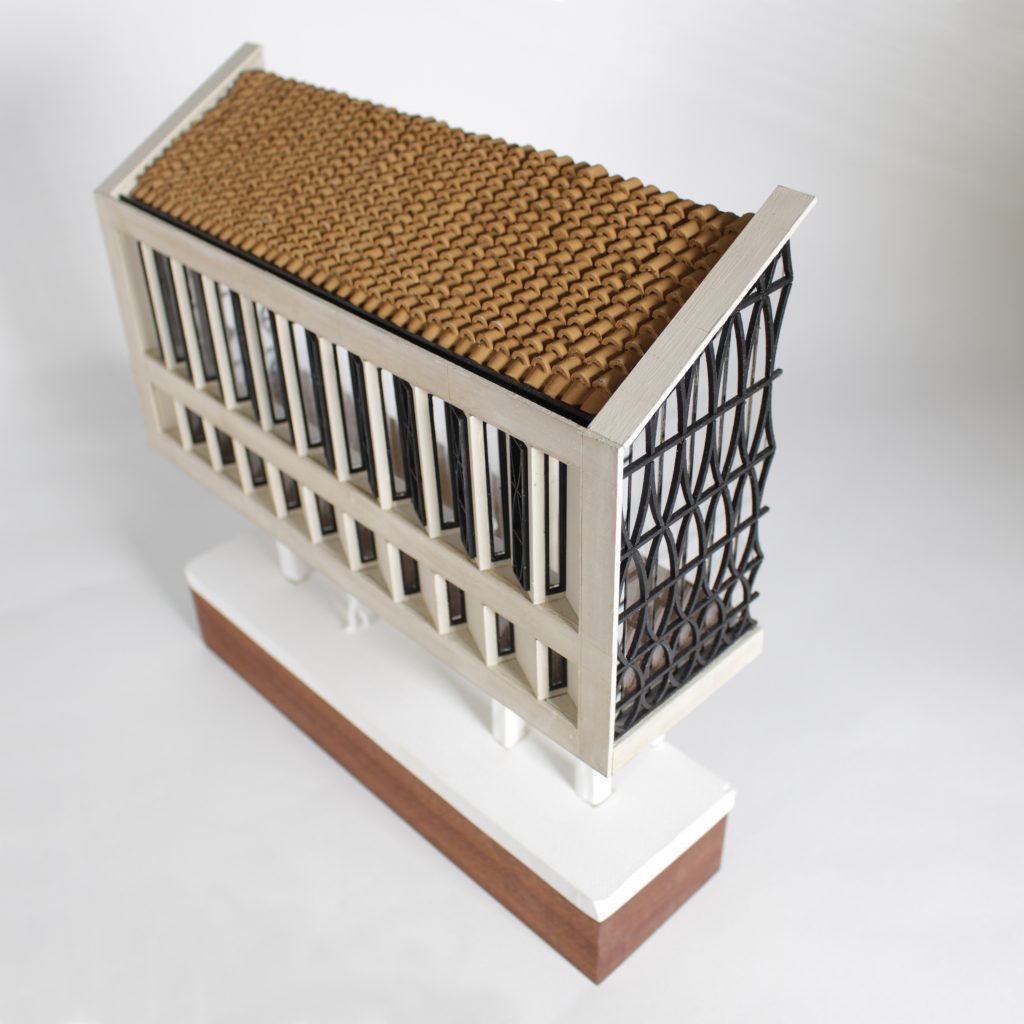
In an increasingly fast paced design world, students face constant pressure to find solutions where the best way forward is left to their own findings. The idea of successful design having to employ the use of ‘cutting edge’ or forward thinking technology dominates with the majority of new starters. This often leads to our students to struggle to grasp why they have been asked to make a model in the first place. For us, the product is secondary to the learning that takes place through making.
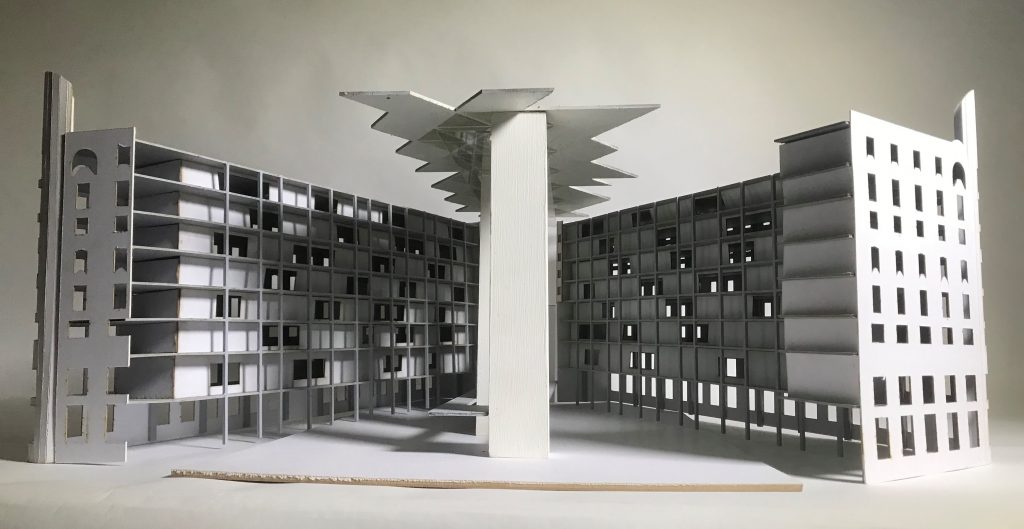
We felt it our job to break down the hype and explore why the act of modelmaking has continued for many hundreds of years of change. Presenting this to both seasoned and future design enthusiasts would allow us to provoke thought and conversation on the subject and with any luck, a fresh perspective on design thinking that never rules out the old fashioned when it is the most efficient solution for the task at hand.
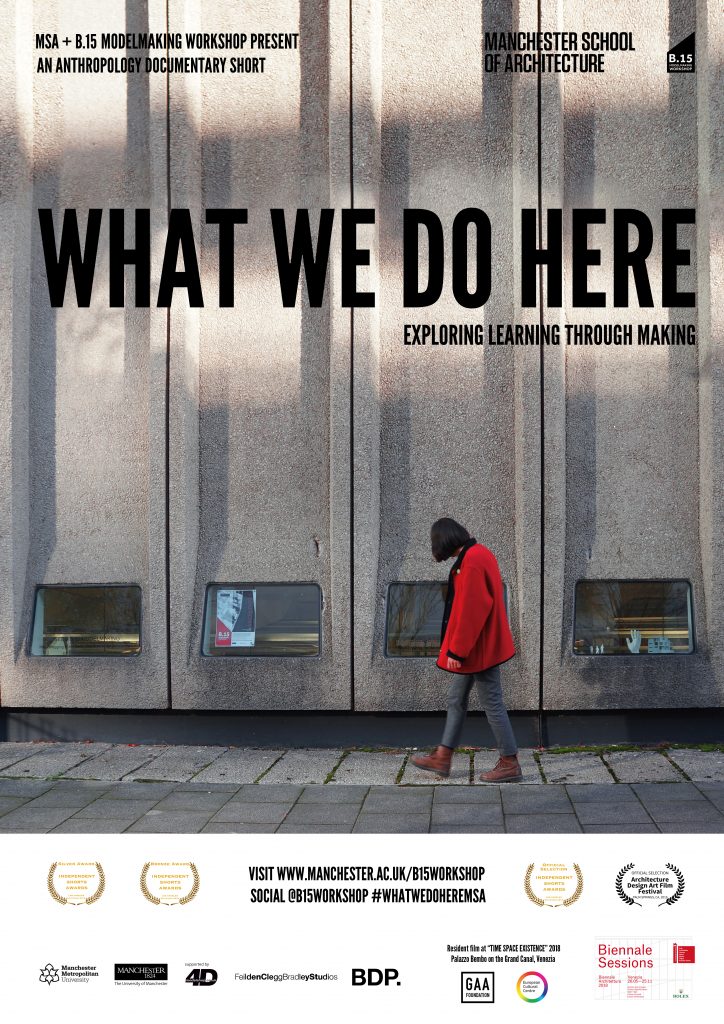
This concept manifested itself as the short film titled WHAT WE DO HERE which premiered in Venice last June. Following the launch event it was then resident at the European Cultural Centre on the Grand Canal for five months where it was seen by tens of thousands of people visiting the city. It has since been screened at Odeon Great Northern in Manchester and has won two awards from the Independent Shorts Film festival in Los Angeles before appearing as part of Modernist Week in Palm Springs.
There have also been a number of further screenings and discussions locally for other institutions, architectural and engineering practices with more on the horizon elsewhere in the UK. The project has been a great opportunity for us to reflect about the reasons behind our craft and with 2020 making 50 years of our workshop, we hope to continue to practice the various aspects of practical modelmaking for many years to come. B.15 workshop can be found on Twitter and Instagram @b15workshop and further information can be found on their blog at www.manchester.ac.uk/b15workshop

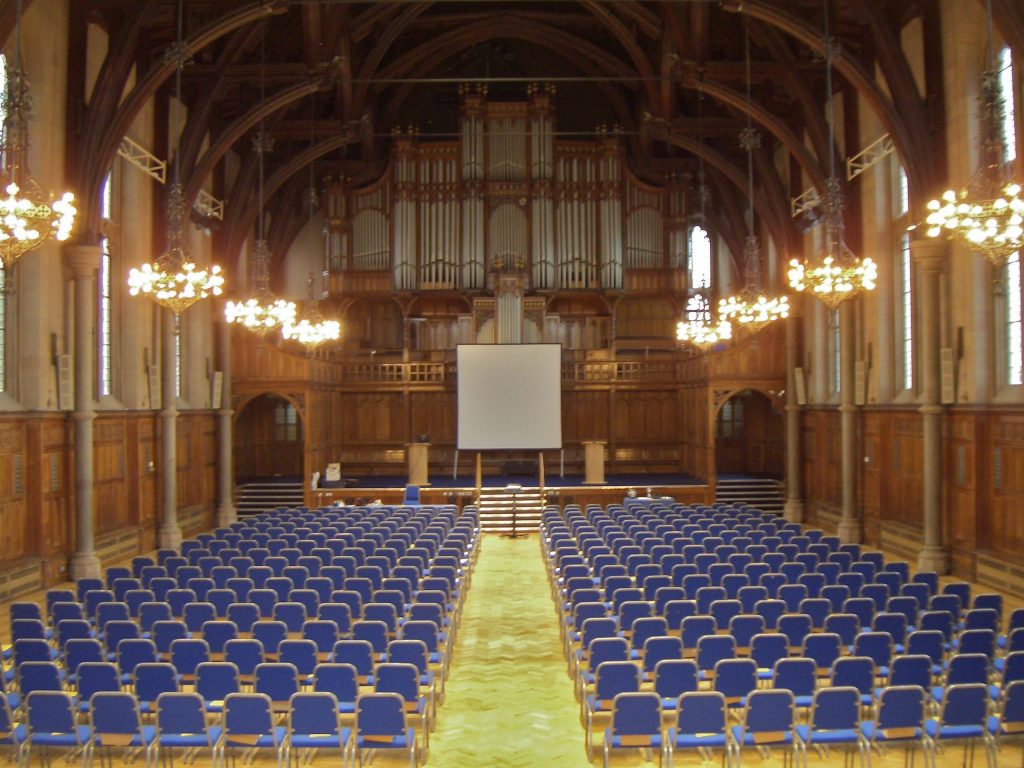

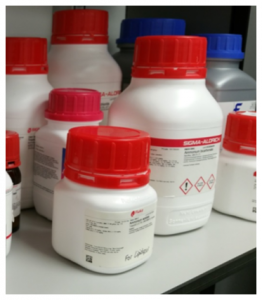 If you’re a member of staff who works with chemicals, the chances are you’ve already been introduced to LabCup, or you will be over the next year. LabCup is an online software package aimed primarily at chemical inventory management. The University has decided to implement it across the entire institution by 2020, with no exceptions. The Faculty of Science and Engineering have already rolled it out to approximately 2/3 of Schools and Research Institutes, and the Faculty of Biology, Medicine and Health will begin this process later on this year.
If you’re a member of staff who works with chemicals, the chances are you’ve already been introduced to LabCup, or you will be over the next year. LabCup is an online software package aimed primarily at chemical inventory management. The University has decided to implement it across the entire institution by 2020, with no exceptions. The Faculty of Science and Engineering have already rolled it out to approximately 2/3 of Schools and Research Institutes, and the Faculty of Biology, Medicine and Health will begin this process later on this year.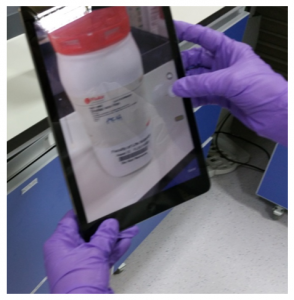 Another reason for choosing LabCup was the clever features such as image and barcode recognition, which streamline the boring data-entry process. As well as having a web interface, there are apps for Apple and soon Android devices which are mobile and can readily be taken into labs to access chemicals in situ. When you enter a chemical onto the system, you have the option of simply taking a photo of the bottle’s label; in a lot of cases, LabCup will identify the chemical name, manufacturer and product number and other critical information without you having to enter the data by hand. Furthermore, it will then search an online database and download the safety data sheet for the chemical and add it to the database automatically. There are some caveats to this: the label has to be in a good state, the bottle has to have been bought relatively recently (and from a mainstream manufacturer), but when it does work, it is a big time-saver. If you already had an inventory spreadsheet or other digital format, these can be uploaded to save you repeating work you’ve already done. As your inventory begins to grow on the database, it can also offer you helpful advice about incompatible chemicals being stored in the same location, and for some potentially dangerous chemicals it will even, for example, suggest a short expiry date to reduce the risk of crystallisation.
Another reason for choosing LabCup was the clever features such as image and barcode recognition, which streamline the boring data-entry process. As well as having a web interface, there are apps for Apple and soon Android devices which are mobile and can readily be taken into labs to access chemicals in situ. When you enter a chemical onto the system, you have the option of simply taking a photo of the bottle’s label; in a lot of cases, LabCup will identify the chemical name, manufacturer and product number and other critical information without you having to enter the data by hand. Furthermore, it will then search an online database and download the safety data sheet for the chemical and add it to the database automatically. There are some caveats to this: the label has to be in a good state, the bottle has to have been bought relatively recently (and from a mainstream manufacturer), but when it does work, it is a big time-saver. If you already had an inventory spreadsheet or other digital format, these can be uploaded to save you repeating work you’ve already done. As your inventory begins to grow on the database, it can also offer you helpful advice about incompatible chemicals being stored in the same location, and for some potentially dangerous chemicals it will even, for example, suggest a short expiry date to reduce the risk of crystallisation.
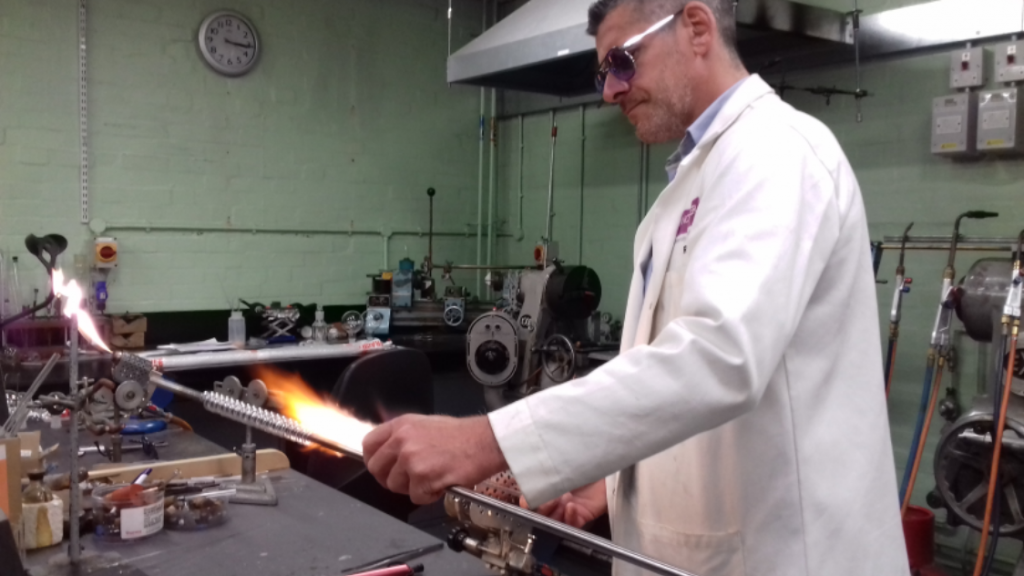
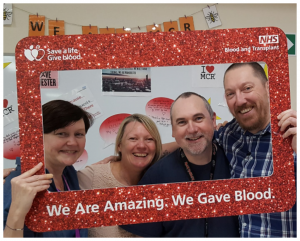 Yvonne Duxbury, David Dennington, Colin Greensmith and their new member of staff Sarah Warburton gave blood at the blood donation centre Plymouth grove on the 11th May. They, Stu Marshall and Sally Ashe, staff from MVU (Microbiology and Virology Unit) are booked to donate again in August.
Yvonne Duxbury, David Dennington, Colin Greensmith and their new member of staff Sarah Warburton gave blood at the blood donation centre Plymouth grove on the 11th May. They, Stu Marshall and Sally Ashe, staff from MVU (Microbiology and Virology Unit) are booked to donate again in August. Have you seen this season’s addition of Learning For All, your easy access round up of what is available from Staff Learning and Development?
Have you seen this season’s addition of Learning For All, your easy access round up of what is available from Staff Learning and Development?